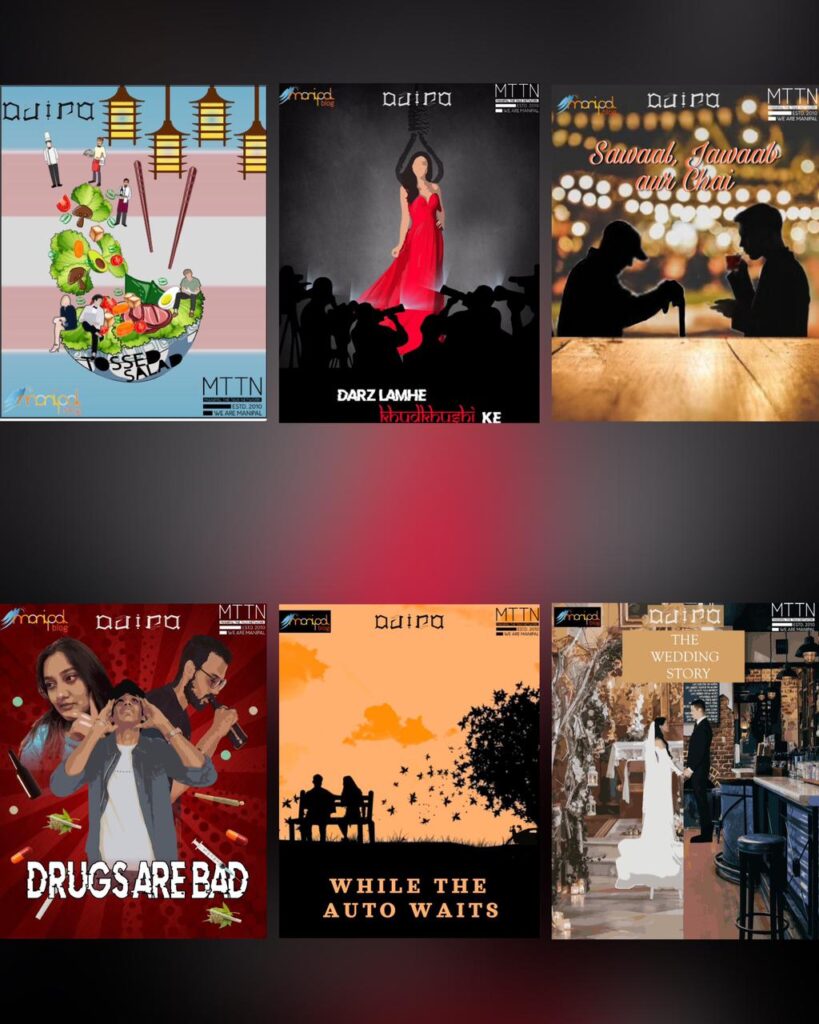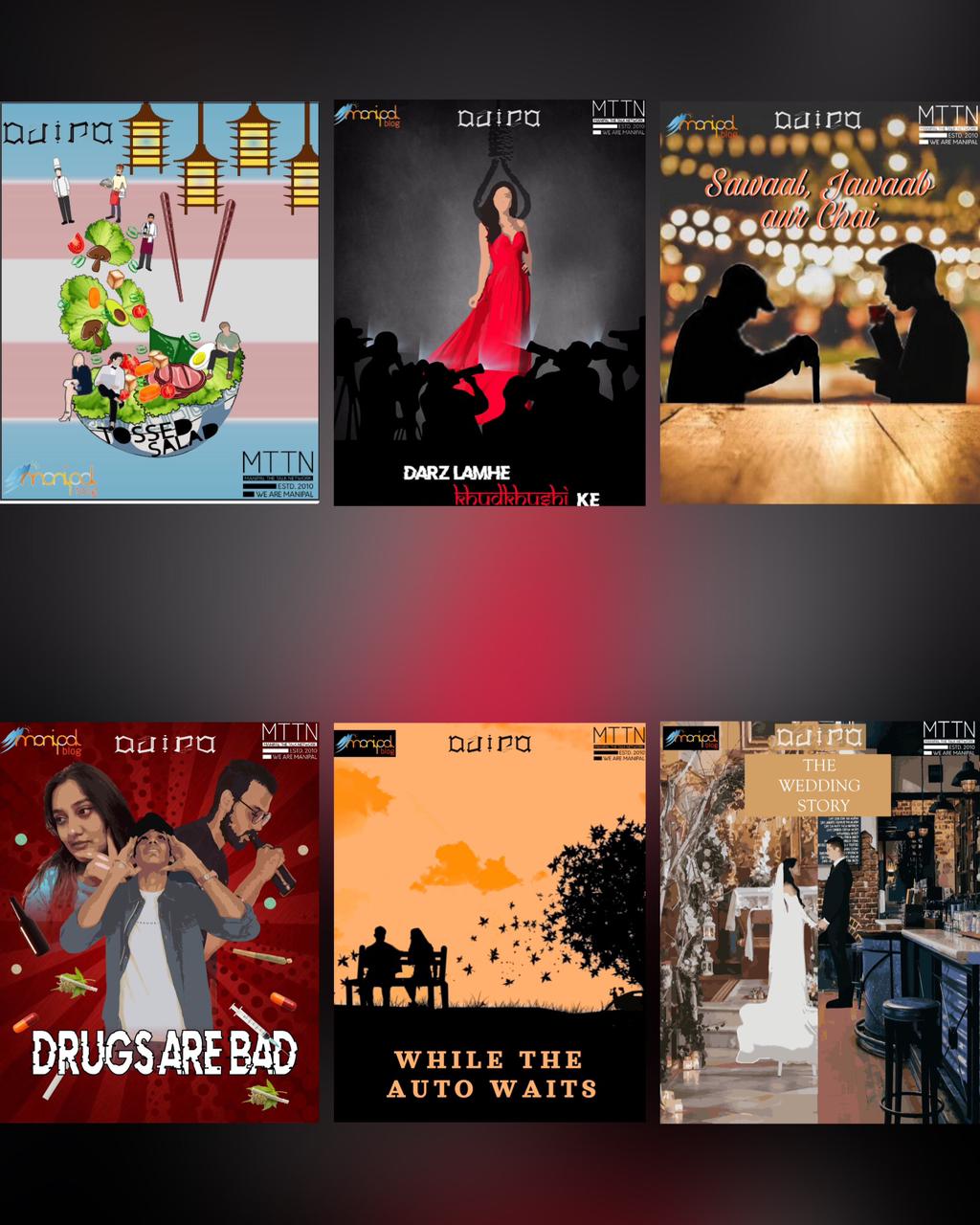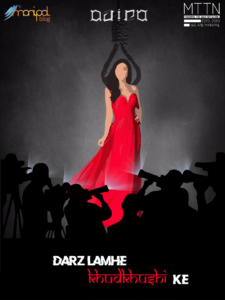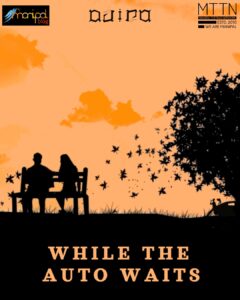
On the 17th of May 2021, Aaina Dramatics organised their first online theatre event of the year, Spotlight’2021. This production, consisting of six short films played exclusively by freshers, was streamed live on YouTube. This is the first event introducing their newly joined recruits, celebrating their recently earned responsibilities.
A panel of judges was brought together to inspect these films. The panel included Prateek Singh—a musician, an actor, and a vocalist. He was on the editing team of the Netflix film called “Rocketry”. The star alumni of Aaina dramatics, Gaurav Chatterjee, who won the best actor in Unmaad 2019, an actor, a drummer, was also part of the panel.
All the actors were divided into six teams: “Tossed Salad”, “Darz Lamhe Khud Khushi Ke”, “Sawaal Jawaab aur Chai”, “Drugs are Bad”, “While the Auto Waits”, and “The Wedding Story”.
Tossed Salad
This play begins with a man and a woman who visit a Japanese restaurant, supposedly, for a date in New Delhi. The man is particularly fond of the restaurant due to its authentic ambience, interior, food and people. Shubhang brilliantly portrays the man who only cares about someone’s social status and lacks chivalry as he yaps about himself and his job.
The series of unfortunate events begins with the waiter’s entry. The waiter, played by Saket, lacks basic etiquettes while serving food and looks least interested in his job. The man’s frustration level increases as he learns that the old Japanese owner retired and a Gujarati—whose ethnicity is portrayed by his loud garba ringtone—now manages the restaurant. The chef cooking his delicious food is also not Japanese but is instead a Maharashtrian is the last straw for the man. Avaneesh, who plays the chef, adds the humour element to the play. Disappointed by the absence of Japanese employees in the restaurant—the man ridicules the staff for their lack of authenticity. Through all these encounters, the lady—the man’s date, looks bored of her mind as she sluggishly nods to all his words.
Ansh does a great job at the end as the manager when he calls out the man for his philosophy on authenticity. He mentions New Delhi is like a tossed salad, with every person bringing a new flavour, adding a unique taste to the city’s monotonous life. While the woman tries her best not to make this date a disaster, both the man and the manager have lost their temper. The play ends with the woman, played by Anika, excusing herself to use the washroom, where she runs into a man who asks her about her date. She shocks everyone by mentioning that she was actually enjoying the date and had a good time. Eeshaan, who portrays the stranger, might not have gotten enough screentime, but he definitely shines as he plays his part.
This play, directed by Aswin and Ritwik, was a wonderful blend of humour and surprises and an incredible way to start off the evening.
Darz Lamhe Khud Khushi Ke
(TW: depression, mentions of suicide)
This play begins with an actress who, the director of a play, had stood up because of her tardiness and her lack of commitment to the play. Before leaving, the director asks her to rehearse her dialogues and leaves her with one of his employees, Raja. The woman is critical of Raja despite having never met him.
Masterfully directed by Nandini, Vaibhav and Dev, the play is about a conversation between 2 strangers—a married woman who showed signs of depression and a man who was on his way back from the temple. The interaction between them revealed the woman’s misery, which was so wonderfully embodied by the actress in the play, that Raja was moved to tears. In an attempt to suppress his surge of emotions, he offers to make tea. But the intensity of the play goes far beyond problems that a soothing cup of tea offers to solve. As they continue with their practice, the play takes a darker turn, revealing that the married woman was stranded on the bus stop by her husband. With this, the actress finds herself treading a dangerously blurry territory, the one where ‘real mixes with the reel.’
Ishita, who plays the troubled actress and the married woman, takes centre stage in this play and shoulders her responsibilities well. Her performance is humane, visceral and, more importantly, transcends all boundaries. Vinayak, who plays Janak, communicates well, his emotions are in check, and he does the important job of being our voice of reason with utmost care. Special props to the editors for the beautiful black and white sequences that somehow gave the play that extra touch of reality.
Sawaal Jawaab aur Chai
It begins with the scene of rain pouring heavily, where Sharma pays a visit to his friend Praveen over a cup of tea. The interaction between them is light-hearted and playful initially, but as Praveen asks a question about Sharma’s son, Sharma feels a surge of emotions due to lack of interaction with his son. Even Praveen reveals he faces the same problem with his own daughter in his internal dialogue. With the progression in their conversation, it is understood how parents might unwantedly create a toxic environment driving their child away from them. As the conversation gets heavier, it is revealed that Sharma is blind. Their internal dialogue shows both have a clear understanding of each other and their problems, but many things are left unsaid in their conversation. They share a close bond regardless of the struggles they may face as individuals.
The characters of this subtle but powerful play are beautifully portrayed by Mohit, who plays Praveen and Aryan, who plays Sharma. A stupendous job by Aryan and Akshat on the direction of the film to portray the simplicity of a conversation over a cup of tea in such a stunning manner.
Drugs are Bad
With nothing to do with drugs, this play portrays accepted societal notions and how people often don’t bother questioning them. It starts with Alex appearing to be sketchy only to show him dancing to Bolo Har Har. He is called by his mother, Rani, in an urgent voice, making him fumble around as he hurries into the drawing-room to be greeted by both his parents.
Rani asks his father, Raghu, to check his bag, and Alex starts to nervously divert their attention as if he is guilty.
It turns out that he has been doing something that shocks his parents…he has been studying. And not only studying but carrying a statue of Ganesh and diyas. This starts a series of taunts imitating Indian parents about all his unwanted activities and how he should be spending his time watching movies, drinking, etc.
It hilariously plays on the typical reprimands most of us have received at some point in our life, just reversed. We get to see how many taunts are based on ideas with no practical grounds and reasoning, much like how it is in reality. The play encapsulates the common aspects of daily parental confrontation, making it relatable and follows a rather unconventional path of parenting, effectively delivering the message.
A fascinating comedic commentary, it has excellent performances by Saarthak, Mihika and Divyanshu, who even from their separate homes have acted in perfect coordination and given it coherence. Rasank and Varad have done an exceptional job, making the play empathetic and natural with a sprinkle of memes.
While the Auto Waits
A thought-inciting play, directed by Jahnavi, Manideep and Mrenank and acted out by Anjali, Aryan, Diya and Armen, shows the conversations between two people who happen to meet each other on a bench. The lady, wrapped in a shawl she claims to be her maid’s, talks eloquently of how she, a noble lady, sought out places like the bench in secrecy to get away from her tiring life and enjoy the bustle of the streets. She talks about how she is bored by a life filled with dinner parties, balls and more such distractions. She expresses how she thinks she might marry a person from a humbler station. When the man says he is a waiter in a restaurant, hinting he might be a good match, she hesitantly refuses, saying she prefers someone having slightly better jobs. When he changes his answer to the cashier, she tries to cut the conversations hurriedly in the name of some engagement she has.
At this moment, another lady appears at the scene, calling her by her name and asking her to return for household duty. She stammers and tries to ignore her friend, not acknowledging her and saying she is mistaken. Her friend grows annoyed and drags her, saying they can not tarry anymore. The man, who had entertained her talks and feigned his lower status, turned out to be a wealthy gentleman who was the one instead to have dinner reservations.
The suspense in revealing the female protagonist’s face foreshadows the ultimate reveal of her true identity. The editing makes the seamless transitions in the play seem as though they were shot in one location. It is an interesting take on how one might idolise a luxurious life and dream about it to the extent of living it for a few minutes in front of a stranger. Even though she was from the working class, she looked down upon it, deeming it unworthy of her as a nobility. It portrays how societies shape our concept of good and evil, wanted and unwanted, thus defining our self-worth.
The Wedding Story
With a twist to conventional storytelling, this play delves into the reality of life and the uncertainties we all must face, regardless of what stories we have in our minds. Directed by Adrija, Yash and Shreyansh, we see a storyteller starting with a pretty traditional tale of how a girl and boy met in high school, fell in love, and decided to marry.
He is interrupted by the bride and groom, who correct him about the details of their relationship. The storyteller tells them to stay out of the story as their version is unsuitable for the children to hear. In this manner, he is interrupted several times by the couple, even arguing with each other. The frustrated storyteller decides to give them what they want and warns them whether they really want the truth of it all. Vain enough, they say yes, and the storyteller starts rambling all about the possible events in their life that are less than perfect or unwanted. Both of them are rendered speechless and quite shamed.
As he finishes, the bride asks pleadingly to go back to the fairytale story since facing this reality is far worse than the filtered version. With natural and well-acted performances by Lakshay, Ananya and Ali, this play is indeed exciting and revealing of how life actually is.
The hosts, Mriga and Khushbo, tied all the plays together with their reflective remarks and sibling banter with their own storyline. The myriad of themes brought out in the event touched our hearts and kept us entertained. At the end of the event showcase, the bloopers certainly humoured the audience, depicted the bonds created and the sheer effort and work undertaken by all those involved. The judges were highly appreciative and thrilled by the entire event.
This year’s instalment of Spotlight showcased promising actors, brilliant direction and crisp editing. The plays were wonderfully executed despite the difficulties of being online. The art of theatre instils emotions, and albeit it is an imitation of life itself, it often draws to the overlooked aspects of society. Aaina certainly wielded the art of theatre that evening and, through their production, sometimes left us laughing, sympathetic but primarily introspective.
Written by Anushka Bhatacharyya, Aakanksha Mantri, Avaneesh M and Sanjana Bharadwaj for MTTN
Edited by Shirley Asangi for MTTN
Featured Image and Images by Aaina Dramatics







Leave a Reply
You must be logged in to post a comment.